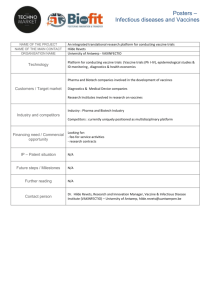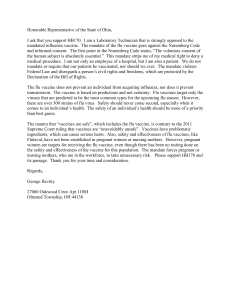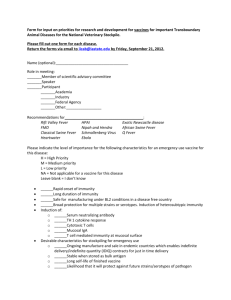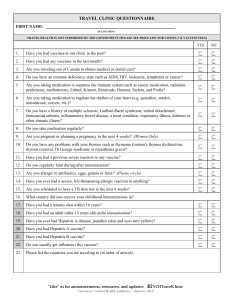Vaccines and porcine gelatine This leaflet describes how and why
advertisement
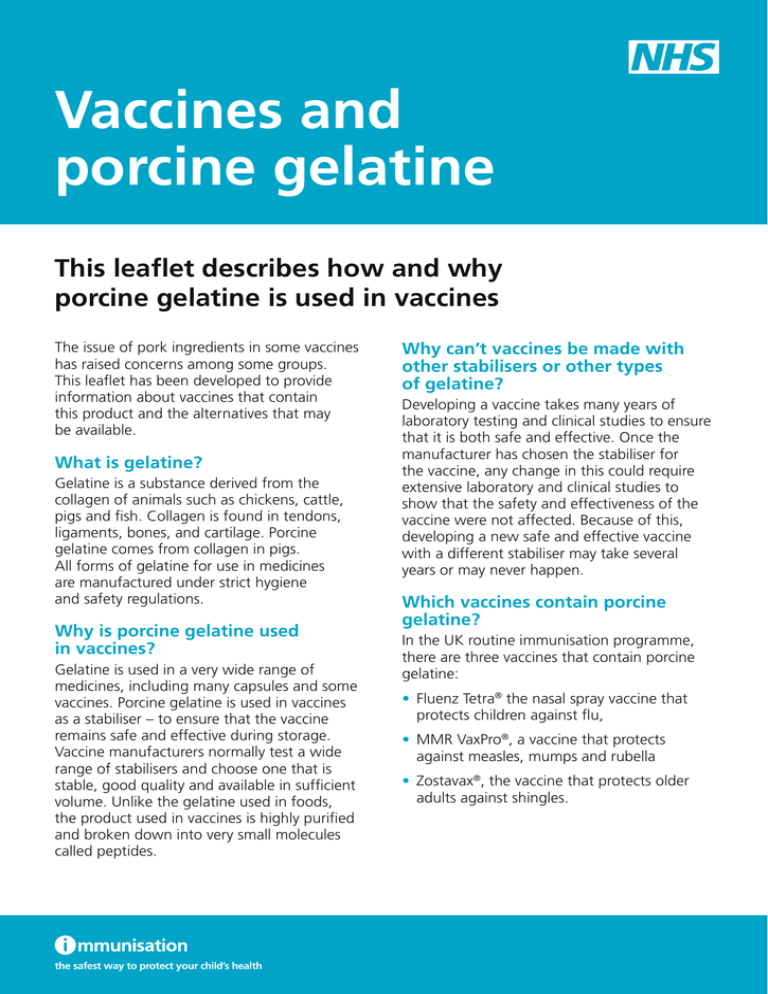
Vaccines and porcine gelatine This leaflet describes how and why porcine gelatine is used in vaccines The issue of pork ingredients in some vaccines has raised concerns among some groups. This leaflet has been developed to provide information about vaccines that contain this product and the alternatives that may be available. What is gelatine? Gelatine is a substance derived from the collagen of animals such as chickens, cattle, pigs and fish. Collagen is found in tendons, ligaments, bones, and cartilage. Porcine gelatine comes from collagen in pigs. All forms of gelatine for use in medicines are manufactured under strict hygiene and safety regulations. Why is porcine gelatine used in vaccines? Gelatine is used in a very wide range of medicines, including many capsules and some vaccines. Porcine gelatine is used in vaccines as a stabiliser – to ensure that the vaccine remains safe and effective during storage. Vaccine manufacturers normally test a wide range of stabilisers and choose one that is stable, good quality and available in sufficient volume. Unlike the gelatine used in foods, the product used in vaccines is highly purified and broken down into very small molecules called peptides. the safest way to protect your child’s health Why can’t vaccines be made with other stabilisers or other types of gelatine? Developing a vaccine takes many years of laboratory testing and clinical studies to ensure that it is both safe and effective. Once the manufacturer has chosen the stabiliser for the vaccine, any change in this could require extensive laboratory and clinical studies to show that the safety and effectiveness of the vaccine were not affected. Because of this, developing a new safe and effective vaccine with a different stabiliser may take several years or may never happen. Which vaccines contain porcine gelatine? In the UK routine immunisation programme, there are three vaccines that contain porcine gelatine: • Fluenz Tetra® the nasal spray vaccine that protects children against flu, • MMR VaxPro®, a vaccine that protects against measles, mumps and rubella • Zostavax®, the vaccine that protects older adults against shingles. What is the view of the faith communities? Public Health England (PHE) has consulted with the Kashrut and Medicines Information Service, who said: ‘It should be noted that according to Jewish laws, there is no problem with porcine or other animal derived ingredients in non-oral products. This includes vaccines, including those administered via the nose, injections, suppositories, creams and ointments.’ However, PHE acknowledges that there is diversity within the British Muslim and Jewish communities and they, and some other groups, may consider medicines and vaccines containing any porcine product to be forbidden. In these circumstances, it is likely that the individual would be unable to accept many pharmaceutical products unless there was no suitable alternative and / or the product was considered life-saving. Are there any suitable alternatives to these vaccines? • MMR: in the UK we have two types of MMR vaccine – MMR VaxPro® and Priorix®. Priorix® does not contain gelatine and is as safe and effective as MMR VaxPro®. • Shingles: Zostavax® is the only shingles vaccine currently available worldwide. • Flu: For healthy children, there are no suitable alternatives to Fluenz Tetra®. There are injectable flu vaccines that do not contain pork gelatine, but these are less effective than Fluenz Tetra® in children. They may also require two doses, and do less to reduce the spread of flu in the community. These vaccines are only recommended as part of the programme for children and adults who are at high risk of the complications of flu. What if people don’t want to have vaccines containing porcine gelatine for themselves or their children? The final decision about whether or not to be vaccinated, or have your child vaccinated, is yours. In order to come to an informed decision you may wish to consider the evidence about the advantages and disadvantages of having yourself or your child vaccinated, and you may wish to seek advice from your faith leaders or other community leaders. Parents not wishing their children to have the porcine gelatine-containing MMR vaccine should request the Priorix® vaccine from their GP. A full course of two doses will provide protection against measles, mumps and rubella. Please note that the practice may need to order this product in specially so it will be helpful to tell them your views before the appointment. If your child is at high risk from flu due to an underlying health condition, the nasal vaccine is considered the best option. If they choose not to have the nasal spray or cannot have it for medical reasons, then they should have a flu vaccine by injection. For adults at high risk from flu, the injectable vaccine should also be given. There is no alternative vaccine available for healthy children as part of the annual NHS programme. However, as more children in your area are vaccinated with the nasal vaccine, you and your family should have a lower chance of being exposed to flu. For older people wanting to protect themselves against shingles there is at present no alternative to Zostavax®. If you would like further information before making your decisions about vaccinations, you may wish to talk to your doctor or practice nurse. This is particularly important if you are at high risk of the diseases that these vaccines effectively prevent. © Crown copyright 2015. First published as a pdf by Public Health England August 2015

